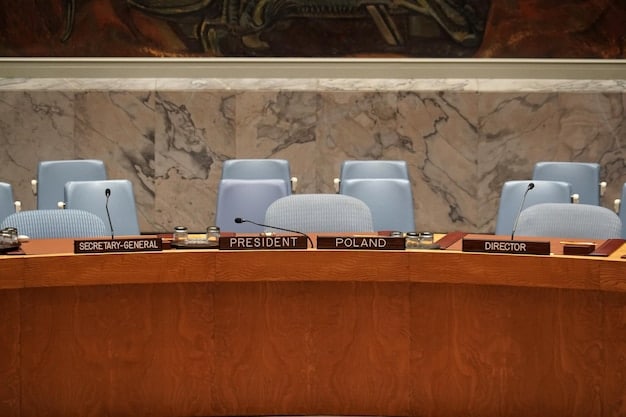US Ambassador to UN: Key Priorities for 2025

In 2025, the US Ambassador to the United Nations will likely prioritize global security, climate action, and human rights, while also focusing on reforming the UN system and strengthening international partnerships to address complex global challenges effectively.
The role of the US Ambassador to the United Nations is critical in shaping international policy and addressing global challenges. Understanding what are the key priorities of the US Ambassador to the United Nations in 2025 provides insight into the direction of US foreign policy and its engagement with the international community.
Navigating Global Security Challenges
One of the foremost responsibilities of the US Ambassador to the UN is ensuring global security. This involves addressing various threats, including terrorism, nuclear proliferation, and regional conflicts. In 2025, this priority will likely remain at the forefront, requiring strategic diplomatic efforts.
Combating Terrorism
The fight against terrorism continues to be a significant global challenge. The Ambassador must work with other nations to share intelligence, coordinate counter-terrorism efforts, and address the root causes of extremism.
Preventing Nuclear Proliferation
Preventing the spread of nuclear weapons is essential for global security. The Ambassador needs to engage in diplomatic initiatives to enforce existing agreements, negotiate new treaties, and monitor countries that may be pursuing nuclear capabilities.
- Enhance international cooperation on intelligence sharing.
- Strengthen global treaties and monitoring mechanisms.
- Address the socio-economic factors that contribute to extremism.
In summary, navigating global security challenges requires a multifaceted approach, combining diplomatic engagement, intelligence sharing, and strategic alliances to address and mitigate potential threats.
Advancing Climate Action on a Global Scale
Climate change poses a significant threat to the planet, and the US Ambassador to the UN must play a crucial role in advancing climate action. This includes promoting the implementation of the Paris Agreement, encouraging countries to set ambitious emissions reduction targets, and supporting climate adaptation measures.

Addressing climate change requires global collaboration and commitment to sustainable practices, ensuring a healthier planet for future generations.
Upholding Human Rights and Humanitarian Principles
Promoting and protecting human rights is a fundamental aspect of US foreign policy. The Ambassador to the UN must advocate for human rights worldwide, addressing issues such as freedom of speech, religious freedom, and the rights of marginalized communities. This involves working with international organizations and governments to hold human rights violators accountable.
Protecting Vulnerable Populations
Protecting refugees, women, and children is a critical aspect of upholding human rights. The Ambassador should support initiatives that provide humanitarian assistance, promote gender equality, and combat human trafficking.
Promoting Democratic Values
Supporting democratic governance and the rule of law is essential for long-term stability and human rights. The Ambassador can assist countries in strengthening their democratic institutions, promoting free and fair elections, and combating corruption.
- Advocate for the release of political prisoners.
- Support programs that promote education and empowerment.
- Work with local organizations to monitor human rights abuses.
Ultimately, upholding human rights and humanitarian principles requires consistent advocacy, strategic partnerships, and a commitment to justice and equality for all.
Reforming the UN System for Greater Effectiveness
The UN system faces numerous challenges, including bureaucratic inefficiencies and a lack of accountability. The US Ambassador must work to reform the UN, making it more effective and responsive to global needs. This includes streamlining operations, improving transparency, and ensuring that resources are used efficiently.

Reforming the UN system can lead to better outcomes in areas such as peacekeeping, humanitarian assistance, and development.
Strengthening International Partnerships and Alliances
Addressing global challenges requires strong international partnerships. The US Ambassador to the UN must work to strengthen existing alliances and build new partnerships to address common threats and promote shared interests. This involves engaging with countries bilaterally and multilaterally to find common ground and advance collaborative solutions.
Enhancing Diplomatic Relations
The Ambassador should cultivate strong relationships with other UN member states, engaging in open dialogue and finding areas of mutual cooperation. This can lead to better understanding and more effective joint initiatives.
Fostering Multilateral Cooperation
Working through multilateral forums, such as the UN Security Council and the General Assembly, is essential for addressing global challenges. The Ambassador must work to build consensus and promote collective action on issues ranging from security to sustainable development.
Strengthening international partnerships and alliances involves proactive diplomacy, mutual respect, and a commitment to shared goals, creating a more secure and prosperous world.
Economic Stability and Global Health Initiatives
In addition to security and humanitarian concerns, economic stability and global health are key priorities for the US Ambassador to the UN. These areas are critical for ensuring sustainable development and overall global well-being.
Promoting Economic Growth
The Ambassador should support initiatives that promote economic growth in developing countries, such as trade agreements, investment opportunities, and sustainable development projects. This helps to reduce poverty and improve living standards.
Addressing Global Health Crises
The Ambassador must also address global health crises, such as pandemics and epidemics, by supporting international organizations like the World Health Organization (WHO) and promoting access to vaccines and healthcare. This ensures a coordinated response to health threats and protects vulnerable populations.
The US Ambassador to the UN in 2025 will face a complex and ever-evolving set of challenges and opportunities. By focusing on global security, climate action, human rights, UN reform, international partnerships, economic stability, and global health, the Ambassador can effectively represent US interests and contribute to a more peaceful, prosperous, and sustainable world.
| Key Point | Brief Description |
|---|---|
| 🛡️ Global Security | Combating terrorism and preventing nuclear proliferation. |
| 🌍 Climate Action | Promoting the Paris Agreement and climate adaptation. |
| 🤝 International Partnerships | Strengthening alliances for common solutions. |
| ⚕️ Global Health | Addressing health crises and promoting healthcare access. |
Frequently Asked Questions (FAQ)
▼
The US aims to promote global security, advocate for human rights, and foster international cooperation to address pressing global challenges, such as climate change and terrorism.
▼
The US Ambassador influences UN policy by negotiating resolutions, building coalitions, and using the US’s position to advocate for its interests and values on the international stage.
▼
The UN plays a crucial role in global security by deploying peacekeeping missions, mediating conflicts, and enforcing sanctions to maintain international peace and security.
▼
The US contributes by setting emission reduction targets, investing in green technologies, and participating in international climate agreements like the Paris Agreement.
▼
UN reform is vital for the US because it ensures that the organization operates efficiently, transparently, and effectively, aligning with US interests and values in addressing global issues.
Conclusion
The upcoming priorities for the US Ambassador to the United Nations in 2025 are multifaceted, requiring a strategic and balanced approach. These priorities reflect the US commitment to global leadership and its dedication to addressing the world’s most pressing challenges collaboratively.





